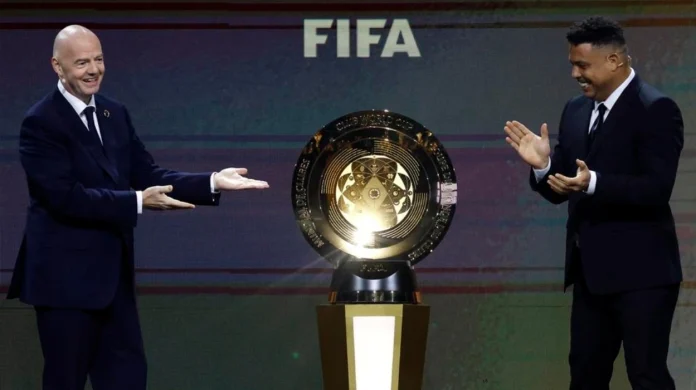The 2025 FIFA Club World Cup marks a watershed moment in the history of club football, as FIFA embarks on its most ambitious expansion yet. The tournament, set to take place in the United States from June 14 to July 13, 2025, will feature 32 teams—a significant leap from the previous seven-team format. This expansion is designed to elevate the Club World Cup to a status comparable with the men’s and women’s FIFA World Cups, both of which are also undergoing expansions in their respective formats. However, this bold move has not been without controversy. The decision has sparked intense debate among stakeholders, with FIFA, players’ unions, football leagues, clubs, and fans all weighing in with passionate arguments. At the heart of the controversy lie concerns about player welfare, scheduling, commercial interests, and the future of the football calendar.
The Rationale Behind FIFA’s Expansion
FIFA’s Vision for Global Growth
FIFA has made no secret of its ambitions for the expanded Club World Cup. The organization sees the tournament as a vehicle for globalizing club football, increasing commercial revenues, and offering more clubs from around the world a shot at international glory.
“The expanded format will increase global interest, offer more clubs a chance to compete at the highest level, and enhance the tournament’s commercial value,”
FIFA has stated, emphasizing the transformative potential of the new structure.
The 2025 edition will feature 32 clubs from every continent, including European giants like Real Madrid, Manchester City, PSG, Bayern Munich, Chelsea, and Flamengo from South America. The tournament will consist of 63 matches over a month, mirroring the format and scale of the men’s and women’s World Cups. FIFA believes that this inclusivity will drive up fan engagement, television ratings, and sponsorship deals, further solidifying football’s status as the world’s most popular sport.
Commercial Success and Financial Incentives
One of the most compelling arguments FIFA has put forward is the tournament’s commercial potential. The organization recently secured a media rights deal worth approximately €925 million, reflecting robust interest from global broadcasters and sponsors. The prize money on offer is unprecedented for a club competition, with the champion potentially earning up to €116 million and the total prize pool set at $1 billion.
“The tournament’s economic impact and global reach will benefit clubs worldwide,”
FIFA asserts, positioning the event as a financial windfall for participating teams. The organization contends that the expanded format will not only reward the elite but also distribute significant financial benefits to clubs from less commercially developed leagues, thereby narrowing the gap between football’s haves and have-nots.
Future Expansion and Inclusion
FIFA’s appetite for growth does not end with the 32-team format. The organization has already hinted at the possibility of expanding the Club World Cup to 48 teams in future editions. This move is being lobbied for by clubs that narrowly missed out on qualification and by those seeking greater inclusion and commercial opportunities. FIFA’s leadership sees this as a natural progression, one that will further democratize access to the world stage and unlock new markets for the sport.
The Backlash: Concerns from Players’ Unions and Football Leagues
Fixture Congestion and Player Welfare
Despite FIFA’s optimistic outlook, the expanded Club World Cup has faced fierce opposition from players’ unions and football leagues, particularly in Europe. FIFPRO, the global players’ union, and the World Leagues Forum have been at the forefront of this resistance. Their primary concern is the already congested football calendar, which leaves little room for rest and recovery.
“The expanded 32-team format causes excessive fixture congestion, threatens player health, and disregards the need for adequate rest and recovery,”
FIFPRO and the World Leagues Forum have argued, warning that the relentless schedule increases the risk of player burnout and injuries. The new tournament effectively eliminates the traditional offseason for many players, forcing them into a year-round cycle of club and international commitments.
Exclusion from Decision-Making
A major point of contention has been the lack of meaningful consultation with players and their representatives.
“FIFA excluded player unions from decision-making and ignored their repeated calls for basic health and safety regulations,”
FIFPRO has stated, highlighting a breakdown in communication between the governing body and those most affected by its decisions. This exclusion has fueled a sense of disenfranchisement among players, who feel their voices are being sidelined in favor of commercial interests.
Legal Action and Boycott Threats
The opposition has not been limited to public statements. Players’ unions and several European leagues have initiated legal action against FIFA, filing complaints with the European Commission and exploring other legal avenues. They argue that the new tournament format violates players’ rights and oversaturates the football calendar, endangering player safety and well-being.
“We are prepared to take all necessary legal steps to protect our members’ health and rights,”
FIFPRO has declared, signaling a willingness to escalate the dispute if FIFA does not address their concerns. England’s Premier League and Spain’s La Liga have even threatened to boycott the tournament unless changes are made, while some players and coaches have hinted at possible strikes if workload and compensation issues are not resolved.
The Clubs’ Perspective: Mixed Reactions and Lobbying
Financial Windfall and Sporting Opportunity
For many clubs, especially those from outside Europe’s elite leagues, the expanded Club World Cup represents a rare opportunity for international exposure and financial gain. The promise of significant prize money and the chance to compete against the world’s best clubs are powerful incentives. Some clubs have even lobbied FIFA for further expansion, arguing that greater inclusion will benefit the sport as a whole.
“We believe the expanded tournament will help level the playing field and provide new opportunities for clubs from every region,”
a spokesperson for a South American club remarked, reflecting the optimism among teams that stand to gain from the new format.
Concerns About Dilution of Competition
However, not all clubs are enthusiastic. There are concerns that expanding the field could dilute the quality of play, as more teams from less competitive leagues are included.
“We must ensure that the tournament maintains its sporting merit and does not become a bloated competition,”
warned a European club executive, echoing fears that the Club World Cup could lose its prestige if it prioritizes quantity over quality.
Fan and Media Reaction: Pricing, Engagement, and Transparency
Ticket Pricing and Fan Engagement
The expanded tournament has also faced scrutiny from fans and the media, particularly regarding ticket pricing and engagement. Initially, FIFA adopted a dynamic pricing model, which led to high ticket prices and poor sales, resulting in empty seats at several matches. The backlash was swift, with fans and commentators criticizing the organization for prioritizing profit over accessibility.
“FIFA slashed prices and launched promotions to boost attendance,”
reported a major sports outlet, noting that the organization was forced to respond to public pressure by making tickets more affordable. This episode highlighted the delicate balance FIFA must strike between commercial interests and fan engagement.
Transparency and Organizational Challenges
Another area of concern has been the lack of transparency surrounding the tournament’s organization. Many clubs and managers have expressed frustration over the slow release of key details about venues, logistics, and scheduling, even as the tournament approaches.
“There is widespread frustration over the lack of details about venues and logistics,”
observed a club manager, underscoring the operational challenges that have accompanied the expansion. FIFA, for its part, has focused on branding and promotional activities, but critics argue that more needs to be done to ensure a smooth and transparent tournament experience.
Political and Legal Complications
Immigration and Political Tensions
The decision to host the 2025 Club World Cup in the United States has introduced a new layer of complexity, particularly in light of the country’s strict immigration policies under President Donald Trump. High-profile incidents, such as Boca Juniors’ Ayrton Costa being briefly denied a visa, have drawn attention to the difficulties faced by international players and teams.
“Trump’s travel ban, even with exemptions for athletes, has created confusion and fears of discrimination or delays for participants from targeted regions,”
noted a human rights watchdog, highlighting the political and legal challenges that could impact the tournament. These issues have fueled calls for boycotts and increased international criticism of both FIFA and U.S. authorities.
Governance and Leadership Criticism
FIFA’s leadership has also come under fire for perceived political entanglements and a lack of transparency. President Gianni Infantino has faced backlash for skipping a FIFA congress to meet with President Trump in Qatar and Saudi Arabia, an action that triggered a walkout by European officials.
“The awarding of the 2034 World Cup to Saudi Arabia without a competitive bid has furthered concerns over transparency, governance, and alleged corruption,”
stated a European football official, reflecting broader unease about the direction of FIFA’s leadership.
Technical and Operational Issues
Agent Exam Failures and Career Impact
Beyond the tournament itself, FIFA has faced criticism for technical failures that have impacted the wider football ecosystem. The June 2025 FIFA Football Agent Exam was marred by global technical failures, leaving many candidates unable to take the test and putting their careers on hold.
“There are calls for FIFA to allow a re-sit to maintain the integrity of the profession,”
reported an industry publication, emphasizing the need for robust systems and fair processes in all aspects of football governance.
Tournament Innovations and Sporting Integrity
New Rules and Mixed Reactions
The 2025 Club World Cup has also been a testing ground for new rules and innovations, such as the eight-second goalkeeper rule. While some observers have praised these changes for adding excitement and dynamism to the game, others remain skeptical about their impact on the sport’s integrity.
“Reactions are mixed, with some praising the changes and others skeptical about their impact,”
noted a football analyst, capturing the diverse range of opinions on the tournament’s experimental approach.
Summary Table: Key Stakeholder Stances
| Stakeholder | Stance & Key Arguments |
| FIFA | Supports expansion for global growth, inclusion, and commercial success; emphasizes financial benefits |
| FIFPRO/Leagues Forum | Strongly critical; warns of fixture congestion, player burnout, lack of rest, and exclusion from decisions |
| Excluded Clubs | Lobbying for even more spots, citing sporting and financial reasons |
| Critics | Warn against diluting competition and overwhelming the calendar |
The 2025 FIFA Club World Cup stands as both a symbol of football’s global ambitions and a flashpoint for some of the sport’s most pressing challenges. FIFA’s vision of a grand, inclusive tournament that generates unprecedented financial rewards and global interest is undeniably ambitious. However, the organization’s approach has exposed deep rifts within the football community, particularly around issues of player welfare, scheduling, transparency, and governance.
“The expanded 32-team format causes excessive fixture congestion, threatens player health, and disregards the need for adequate rest and recovery,”
FIFPRO and the World Leagues Forum have warned, encapsulating the anxieties of players and leagues who feel sidelined by FIFA’s commercial priorities. Meanwhile, FIFA maintains that
“the tournament’s economic impact and global reach will benefit clubs worldwide,”
insisting that the expansion is a necessary step toward the sport’s future.
As the tournament unfolds, the world will be watching not just the matches on the pitch, but also the broader battle for football’s soul—a contest between commercial ambition and the enduring values of sporting integrity, player welfare, and fair governance. The outcome of this debate will shape the future of club football for years to come.













